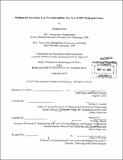Bridging the innovation gap through funding : the case of MIT Deshpande Center
Author(s)
Kwon, Ohchan
DownloadFull printable version (7.517Mb)
Other Contributors
Massachusetts Institute of Technology. Technology and Policy Program.
Advisor
Charles L. Cooney and Fiona E. Murray.
Terms of use
Metadata
Show full item recordAbstract
The idea of gap-funding program, in which academic scientists are given research funding for developing proof-of-concept and prototype, has recently attracted attention as a policy measure of commercializing academic science. While the earliest programs of its kind were initiated about a decade ago, we still lack empirical evidence on its effectiveness. Using the detailed dataset of the gap-funding program at MIT, the Deshpande Center for Technological Innovation, I observe two mechanisms that gap-funding program can facilitate academic commercialization. First, by providing research funding that allows academic freedom of problem selection and mode of disclosure, gap-funding program attracts applications from junior faculty members with commercialization interests. Second, providing research funding for prototype development and networking opportunities with industry practitioners increases the likelihood that an academic invention results in start-up founding. Moreover, its positive impact is larger for inventions without intellectual property rights protection, partly because of the reduced level of uncertainty after prototype development. However, awarding gap-funding does not increase the likelihood of technology licensing to incumbent firms. Together, I argue that gap-funding program can be a useful policy toolkit for regional economic development by fostering academic entrepreneurship.
Description
Thesis: S.M. in Technology and Policy, Massachusetts Institute of Technology, Engineering Systems Division, Technology and Policy Program, 2013. Cataloged from PDF version of thesis. Includes bibliographical references (pages 58-59).
Date issued
2013Department
Massachusetts Institute of Technology. Engineering Systems Division; Technology and Policy ProgramPublisher
Massachusetts Institute of Technology
Keywords
Engineering Systems Division., Technology and Policy Program.